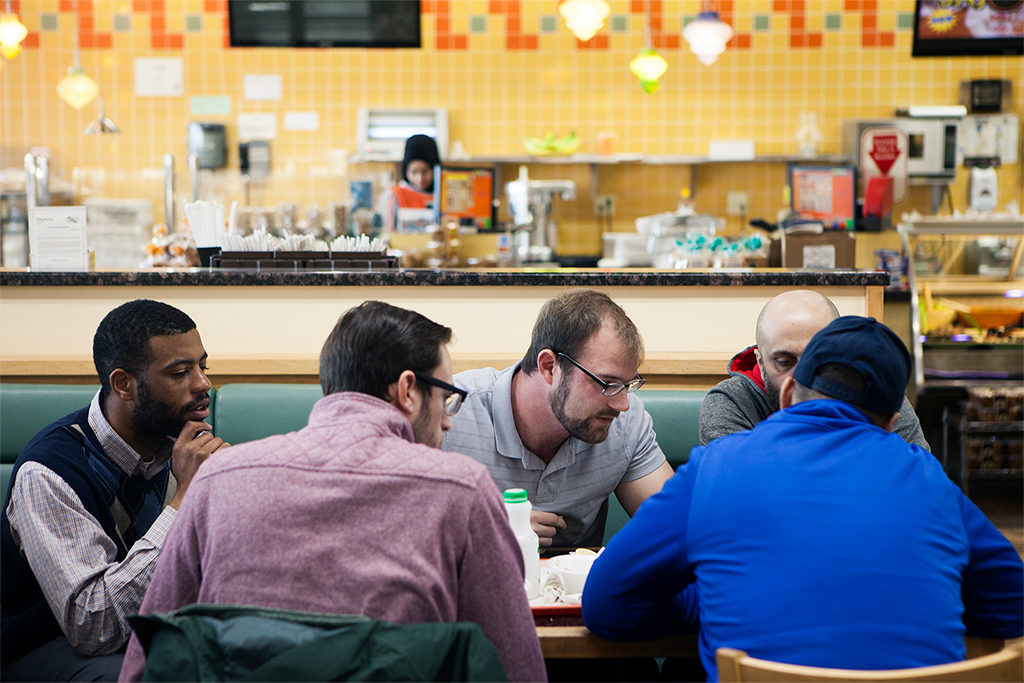DEARBORN, Mich. — Southern Seminary students visited Dearborn, Michigan, home of the largest concentration of Arab-Americans in the United States, to pray for and evangelize local Muslims, Feb. 24-26. Led by Ayman S. Ibrahim — Bill and Connie Jenkins Professor of Islamic Studies and director of the Jenkins Center for the Christian Understanding of Islam — the team interacted with a few of the more than 100,000 Arab Americans who comprise at least 45 percent of Dearborn’s population.
The 13 students from Southern and Boyce College visited local Arab bakeries and restaurants, starting conversations with Muslims and discussing the Christian faith. The team also visited the Islamic Center of America, which was one of the largest mosques in the United States when it was built in 2005. Several students received the contact information for Dearborn residents they met during the trip with the intention to have follow-up conversations about the gospel.

Formerly the home of Henry Ford and still the home of Ford Motor Company, Dearborn attracted many Arab car factory workers during the early 20th century and boasts the highest concentration of Muslims of any city in the United States. Most of the students had taken classes with Ibrahim, who is from Egypt originally and overflows with evangelistic passion for Muslims and energetic leadership of his students.
“Evangelism is not impossible, beginning a conversation with Muslims is not impossible, and people are ready to listen,” said Ibrahim, regarding lessons the students learned from the trip. “It’s completely worth it when you see you’re opening eyes and changing minds.”
The team not only saw the religion of Islam close-up when they visited the mosque, but also spoke with practicing Muslims face-to-face, applying in real-time what many of them have learned in class with Ibrahim.
“To me, it’s really encouraging to have learned things in class about Islam and use that [in conversation],” said Josh Hildebrand, an M.Div. student in Islamic Studies who has studied Arabic at Southern. “Having the class definitely made me feel a lot more credible and a lot more respected.”
The trip gave students a more balanced perspective on Muslims, said Ashley Ulrich, a 2013 graduate of Southern Seminary with an M.A. in Education. Most Muslims know very little about Christianity and likely have never talked at length with a Christian. American Christians should not equate all Muslims with ISIS or other terrorist extremists, she said, but recognize them as fellow humans created in God’s image and in need of the gospel.

“Muslims are just people. We build relationships with them in the same exact way that we build relationships with anybody. You find out the superficial stuff first and then you go a little bit deeper,” Ulrich said. “That’s how I get to know every other nationality of people, why would I treat them any differently just because they come from a different religious context?”
‘Sharing what you know’
In frigid, wintry Dearborn, the evangelism of Southern and Boyce students was hardly glamorous or tweetable. They gathered each evening during the Feb. 24-26 trip in the small, cluttered choir room of a nearby church and prayed, reported on their evangelistic encounters, and listened to the stories of local outreach veterans from the community. “Muslims in this city have been vaccinated against Christ,” said an Arab Christian about the Middle Eastern Muslims living in the United States, for whom the most basic explanations of the Christian faith are not new. “Reaching them requires a commitment to them [as people], not just a curiosity about them.” The students spread out to local bakeries and restaurants, enjoying local food (“very, very authentic,” according to Ibrahim), and trying to jump-start spiritual conversations. For several, it was hard sledding, but a few students were able to build bridges and even get the contact information of a few Muslims with hopes of following up.
“I used to think I had to know it all before I could evangelize,” said Lenny Hartono, an M.A. student in biblical counseling. Hartono is from Indonesia, which has the largest number of Muslims by raw population of any country in the world, according to the Pew Research Center. Her preferred — and usually successful — conversation starter in Dearborn was simple. Hey, I’d like to be your friend. “I learned that prayer is important, God is sovereign, so if you feel fearful, remember that God doesn’t need your ability; he needs your availability,” she said. “You are a witness. You are sharing what you know, not what you don’t know.”
Muslim evangelism doesn’t have to be elaborate or highly strategized, said Jim Rairick, a Ph.D. student in biblical theology at Southern Seminary who is originally from Michigan. Rairick has worked with many different international groups, having helped launch an international student ministry at University Reformed Church in East Lansing, Michigan, in the late 1990s (before later being convinced of believer’s baptism and becoming a Baptist).
Since most internationals feel like utter strangers in the United States, reaching them can be as simple as finding a Muslim living near you and cooking them a meal or baking them a dessert. This wouldn’t be strange to them, he stressed. Simple, practical kindness can go a long way. Ask basic questions you’d ask anyone: Where are you from? Do you have brothers and sisters? Are you working? Is it hard to live in the U.S.? Don’t be afraid to veer into religious topics, either — Muslims are still going to be very theistic and they enjoy talking about religion, he said.
 “Most people think engaging Muslims or talking to Muslims about Christianity is difficult. It’s not difficult,” Rairick said. “It’s just as easy to talk to a Muslim about the things of God (although our gods are different) as it is to talk to Westerners about basketball or football. It really is that easy. You don’t have to argue with them, you don’t have to debate with them, but let them know that you love Jesus Christ and you’re a worshipper of the one, true God.”
“Most people think engaging Muslims or talking to Muslims about Christianity is difficult. It’s not difficult,” Rairick said. “It’s just as easy to talk to a Muslim about the things of God (although our gods are different) as it is to talk to Westerners about basketball or football. It really is that easy. You don’t have to argue with them, you don’t have to debate with them, but let them know that you love Jesus Christ and you’re a worshipper of the one, true God.”
Now on staff at Horizons International, a missions organization focused on reaching Muslims, Rairick is writing his dissertation and building relationships with Muslim families in his community. A member of Clifton Baptist Church, Rairick thinks local churches must be willing to ask hard questions and put their outreach strategies under the microscope if they’re going to reach the many Muslims in Louisville. Evangelizing Muslim neighbors is a worthy goal, but requires a greater investment than most realize, Rairick said. In many cases, it might require a significant, life-changing commitment to reaching Muslims, and the radical sacrifice of money, comfort, and above all, time.
“If you’re already struggling in evangelism — if you’re already timid, fearful, and struggling with selfishness of time — you’re going to struggle even more when it comes to reaching Muslims,” Rairick said. “Most people I know who are involved with Muslim-focused ministry in any concerted way are realizing it takes more time over a long period of time.”

‘A GOOD SPRINGBOARD’
Evangelizing Muslims in Dearborn, Michigan, gave many students the confidence to evangelize them anywhere in the world, said Hartono.
“From this trip, I feel the Lord has equipped me to be a better evangelist when I go back to my country,” she said, adding she thought the originally Middle Eastern Muslims that populate the Dearborn area would be much harder to connect with than her fellow Indonesians. “I thought the Muslims from the Middle East would be violent, not as open, scared of Christians, and hate Christians. But they’re so open! My own people — whom I know so well — will be even more open. After this trip, I will be able to be more courageous to share with my own people.”
The interactions in Dearborn required patience, Hartono said, since the students’ primary goal was to challenge Muslims to think about Christianity differently and begin to build relationships. She found that, contrary to how most Westerners perceive Middle Eastern Muslims, they were welcoming, friendly, and open to having deep conversations about religion. The trip has given Hartono more confidence to evangelize all non-Christians, not only Muslims, she said.
“This trip was a good springboard. Muslims are the people in my head that are the most difficult, the most resistant, the most unwelcoming,” Hartono said. “So if the people I thought would be resistant are actually open, this can give me confidence that the Lord can use this to equip me to evangelize anybody he wants me to share the good news with.”
The trip also underscored the importance of prayer in evangelism, said Ulrich. While visiting a restaurant, a member of Ulrich’s team reminded her she needed to pray for each conversation as it took place. She found herself praying for three different conversations going on simultaneously, even forgetting to eat her own dinner. Prayer is necessary in evangelism before, during, and after a conversation, and the necessity of praying during evangelism became clear to Ulrich during the trip.
“I’ve never thought about [prayer] that way before,” she said. “The reality is the Holy Spirit is going to do what he’s going to do regardless of whether I intercede or not. I don’t believe that he’s going to not work because I’m not faithful. But the fact that God allows me to be a part of that because of his love and he invites us into relationship with him … that’s kind of a big deal.”
Reflecting on the trip, Rairick said he was reminded of the unique opportunity American Christians have to reach people once considered unreachable. Although Louisville, Kentucky, doesn’t have as many Muslims as metro Detroit, the opportunities to meet Muslims without driving more than 10 minutes from the seminary are significant. Beyond the geographical advantages, however, Rairick thinks there might be some newly fertile soil in the hearts of Muslims.
“The majority of Muslims globally are disillusioned by current-day Islam,” said Rairick, appealing to the reports of many missionaries overseas. “Most Muslims are running away from Islam, and most Muslims when they come to the United States are running from Islam for a variety of reasons. We don’t always need to understand all those reasons … but even for those Muslims who might come to the States with bad intentions, we need to remember that the God of the Bible has the ability to change the hearts of kings, and he changed the heart of Saul into one of the most radical missionaries we’ve ever known.
“In most cities, you don’t have to travel far to engage Muslims. The question is whether you have the eyes to see them. Do you have the eyes of Jesus, Paul, Peter, and God himself? When you see Muslims, do you see them as obstacles, threats, problems — or do you see them as lost sinners whom we can love and engage with the truth of Scripture and the power of the gospel so they too can find everlasting life?”
The Jenkins Center, established in 2014 through the support of Bill and Connie Jenkins, exists to foster a scholarly Christian understanding of the many strands of Islam. The center sponsored the student trip to Dearborn. More information about the Jenkins Center is available at jenkins.sbts.edu.



